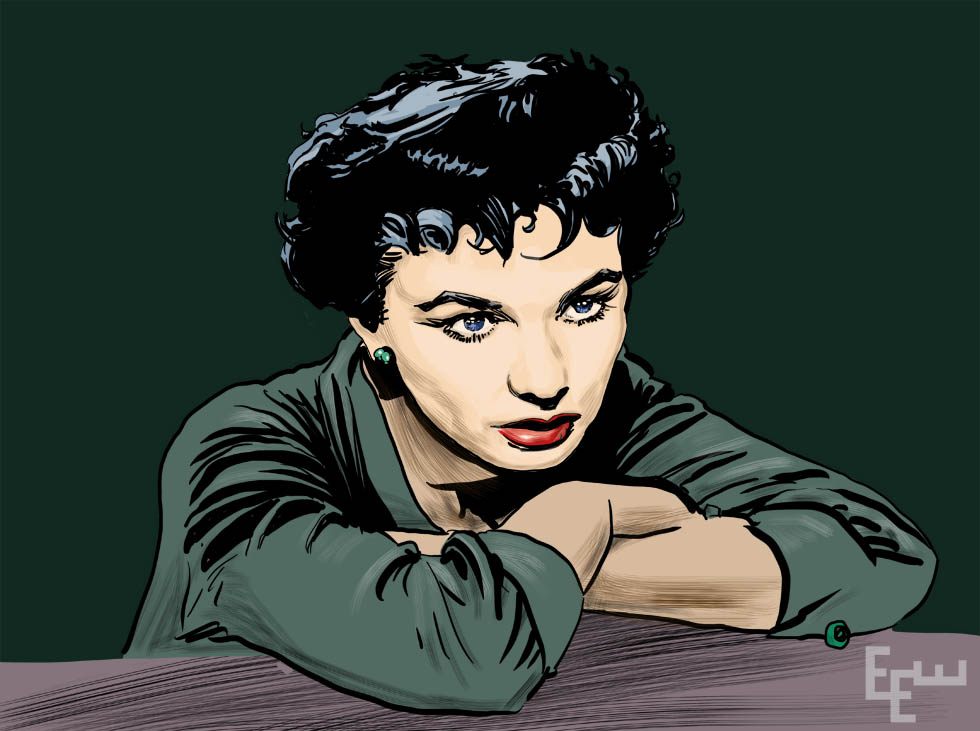Hilda Crane - 1956
Jean Simmons stars in Hilda Crane, an 87 minute melodrama of the 1950s about a twice-divorced young woman trying to come to terms with her past, her manipulative and emotionally claustrophobic mother, and her small town where everyone knows everything about everyone else. Struggling to conform comes with also an internal desire to revolt, and then understandably, confusion.
The film is benefited by but is also hurt by the era in which it was made. Well-produced with beautiful sets and cinematography, Hilda Crane has a lot of nice work by the star (Simmons) but is hampered by some of the conventions of the writing. This is ironic since the story chronicles the resistance by our main character Hilda against small town "convention" which has confused her all of her young life.
A problem for the movie is that dialogue for major drama films had changed by the mid-1950s. Influences from stage and new styles of writing had some Hollywood actors in front of cameras talking about their emotions instead of showing us emotions. This would then end with climaxes in which the characters had spent a whole act sweating and talking about their building emotional pressures, and then they finally come unglued, and their fractured circumspection leads to shouting and rage. This is supposed to be "real life" and effective as drama, but somehow cinema over-amplifies this sort of staging of a story, making it so big and overblown it can become absurd (or even laughable) with unreal extremes.

Hilda Crane comes close to this a number of times, but since so much depends on Simmons (instead of an ensemble cast, like a Tennessee Williams' tale, who was probably the master of this sort of tale and making it work well), Jean Simmons usually modulates away from screen tantrums and histrionics, and instead pulls the merciless plot along behind her as Hilda tries to find a human way to live with all of the unwritten rules of a badly-organized society that she can't quite comprehend.
Guy Madison is a love interest which provides stability and sincerity, but his character is also plagued by codes of conduct (and he's got a significant mother problem, too) that prohibit honest reflection when competing against the demands of guarding a reputation, often requiring only that a person must appear "good," not actually be Good.
In the not-good department is lustful Professor Jacques De Lisle (Jean-Pierre Aumont), determined there is some way to sell Hilda on the proposition that as long as a person can sneak around carefully (or just sneak away from the town where so many watching eyes are), one can basically do whatever they want, and he is pretty clear about what he wants. Hilda, though, just wants to be sincerely loved for herself, a tall order in this movie where people are devoted to images of themselves, other people and society as a whole.
What's Recent
- Grand Exit - 1935
- Island of Desire - 1951
- Road to Morocco
- The Devil and Miss Jones - 1941
- Sinners - 2025
- Something for the Boys - 1944
- The Mark of Zorro - 1940
- The Woman They Almost Lynched - 1953
- The Cat Girl - 1957
- El Vampiro - 1957
- Adventures of Hajji Baba – 1954
- Shanghai Express 1932
- Pandora's Box – 1929
- Diary of A Chambermaid - 1946
- The City Without Jews - 1924
- The Long Haul
- Midnight, 1939
- Hercules Against the Moon Men, 1964
- Send Me No Flowers - 1964
- Raymie - 1964.
- The Hangman 1959
- Kiss Me, Deadly - 1955
- Dracula's Daughter - 1936
- Crossing Delancey - 1988
- The Scavengers – 1959
- Mr. Hobbs Takes A Vacation - 1962
- Jackpot – 2024
- Surf Party - 1964
- Cyclotrode X – 1966
Original page August 2020 | Updated April 20, 2022
